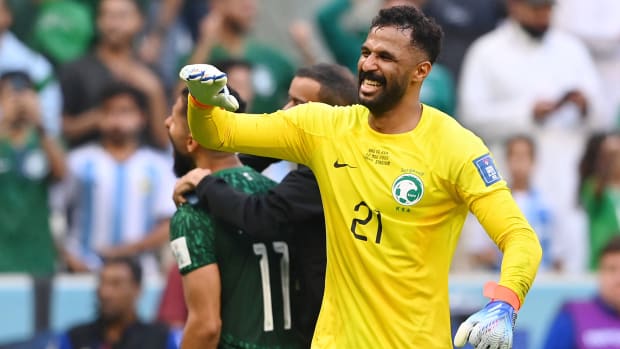Argentina came into the 2022 World Cup as one of the favorites. It had not lost in 36 games, one shy of the men’s international record. This was supposed to be Lionel Messi’s World Cup, the moment when, at the very last, he would win the one tournament that has continued to elude him. He has been in form for Paris Saint-Germain. He finally has a balanced team in which to play, one that offers him a platform and accentuates his virtues. The Copa América success last year finally broke the Argentina trophy drought that stretched back to 1993.
The doubt had been, though, that in that 36-game run, Argentina had played only three UEFA sides and one of them was Estonia (currently 109th in the world). Would it be as effective against the physicality and pressing of a top European side? That test is still to come—but it couldn’t even handle Saudi Arabia. Winning the World Cup suddenly looks a very long way off after the 2–1 defeat, while even getting out of the group, which features Mexico and Poland sides now having considerably different outlooks, will take an almighty effort.
This was one of the great World Cup shocks, up there with Senegal beating France in 2002, Algeria beating West Germany in 1982 and the USA beating England in 1950. This was only Saudi Arabia’s fourth win in 17 World Cup matches. The winner from Salem Al-Dawsari will probably eclipse even Saeed Al-Owairan’s 50-yard dribble against Belgium in 1994 as the most famous goal in Saudi history. After the miserable performances from Qatar and Iran on the first two days of the tournament, there was a sense that the first West Asian World Cup needed this.

Natacha Pisarenko/AP
Yet the first half had looked like following the same pattern. Argentina took the lead with an early penalty converted by Messi. There were other chances, three goals disallowed for offside, one on an extremely marginal call. In retrospect, perhaps the high Saudi line was a masterstroke from Hervé Renard, its experienced coach, but in that first half it felt distinctly risky.
And yet even as the half wore on, an element of anxiety crept into the Argentinian play. The second goal would not come. This was not going to be the facile victory it had seemed. The Saudis stepped it up in the second half. They pressed with extraordinary aggression. They pinned Argentina back. They forced mistakes. And then they scored, twice, in the space of four minutes.
Suddenly Argentina was living a familiar nightmare. It specializes in bad starts to World Cups: defeat to Cameroon in the opening game in 1990 most obviously, but also the draw against Iceland four years ago and the defeat to Belgium in 1982. The scratchy wins over Bosnia-Herzegovina in 2014, Nigeria in 2010 and 2012 and Japan in 1998 were less than impressive. Only in 1994, when it beat Greece 4–0, has Argentina begun a tournament in truly eye-catching style—and that, of course, was the game after which Diego Maradona failed his drug test.
But this was any number of other games Argentina has played at recent World Cups, chasing the game and somehow lacking the ruthlessness, precision and calm to open teams up. This was that Iceland game in Moscow. It was the defeat to Croatia. It was the defeat to France. When Argentina loses, it always looks like this, chugging away, running out of ideas, desperately hoping Messi would do something. It’s true that Argentina won on the expected goals scoreboard 2.23 to 0.14, but by the end, it was playing utterly without conviction.

Markus Ulmer/Teamfoto/Imago Images
Messi had one of those games he so often has at World Cups. Having missed an early chance, slightly scuffing his effort from the edge of the box so that sensational Saudi keeper Mohammed Al Owais could parry, he flitted vainly in the space behind Lautaro Martínez, never quite able to time a through ball. He converted the penalty, but that aside, his involvement was unconvincing, frustrated. But that, of course, is part of the problem as it always has been. Argentina cannot just be about one player and yet it inevitably is—and all the more so in the absence of Giovani Lo Celso, whose link-up with Messi had been such a key part of Argentina’s play over the past year or so.
What is most important now is that Argentina does not panic. Familiar as the style of the defeat was, that xG scoreline suggests that this was something of a freak. Any temptation to enact major changes must be resisted. Win against Mexico and Poland, and it will go through—and that’s far more likely to happen with the core that carried Argentina unbeaten through those 36 games than anything else.
For 51st-ranked Saudi Arabia, meanwhile, there is celebration and a very real—and very unexpected—possibility of progress to the last 16. As Renard said after the match, “This result will go down in the history of the World Cup and of Saudi Arabia forever.”
Watch the 2022 World Cup with fuboTV: Start your free trial today!







